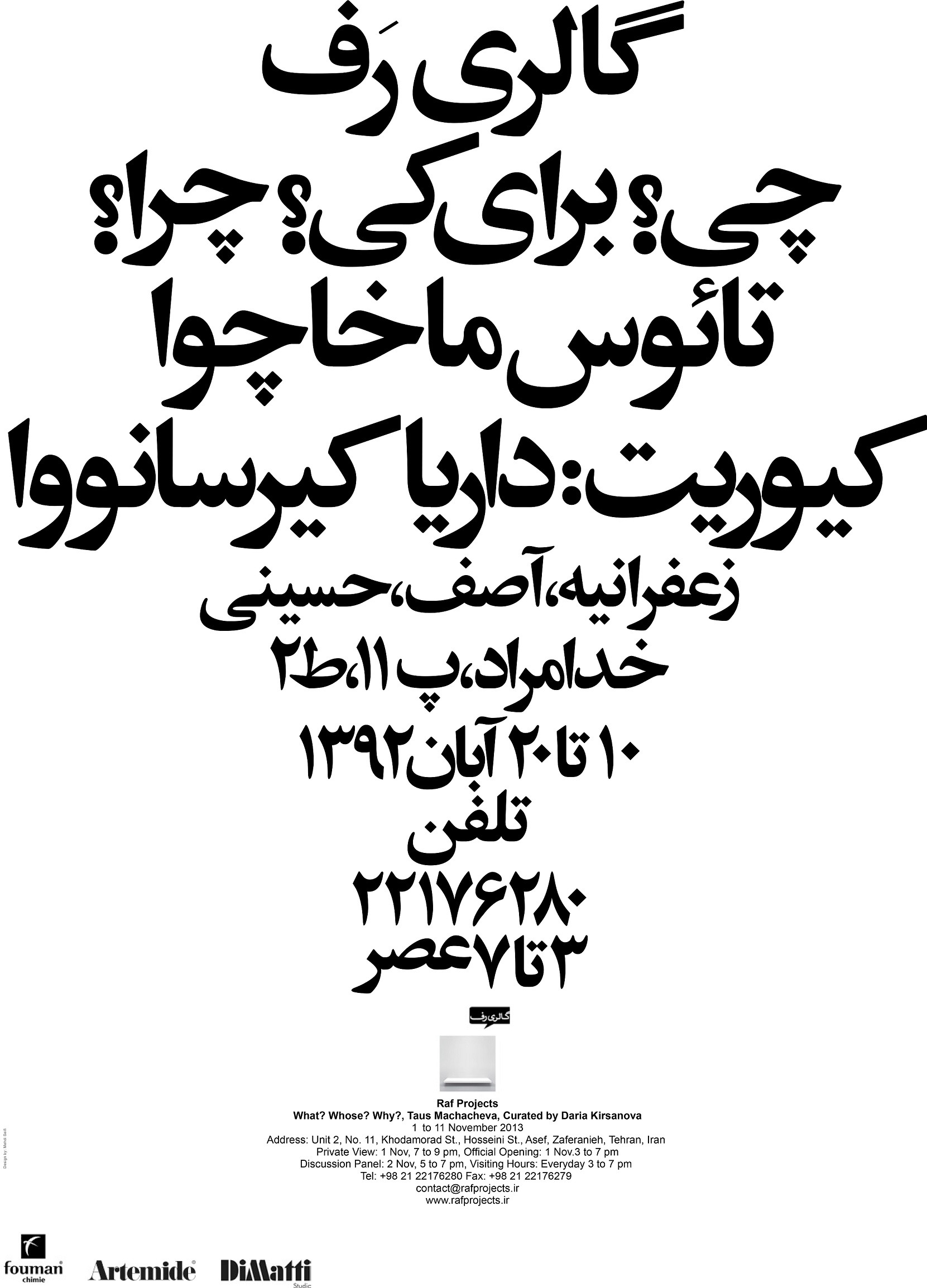What? Whose? Why?
Taus Makhacheva
Curator: Daria Kirsanova
November 1-11, 2013
Raf Gallery

Raf Projects is pleased to announce ‘What? Whose? Why?’ first solo exhibition in Iran by prominent Russian video and performance artist Taus Makhacheva.
In her practice Makhacheva deals with a question of intercultural exchange, integration and a notion of national identity. In the situation of contemporary Russia this set of questions, without any doubt has a particular political poignancy. After the decades of the Soviet Union state machine meticulous, but nonetheless failed, efforts to homogenize the diverse ethnic and national groups living on its territory into one nation of ‘Soviet people’, there is an acute need to rethink, recontextualise and, reappropriate one’s identity. Through her work Taus Makhacheva comes to grips with the socio-cultural context of her native Dagestan; – one of the Russian Republics in Northern Caucasus that has decidedly dense and multilayered ethnic, historical and cultural background. Makhacheva seeks to establish her own personal connection to this context, which adds a deeper, more intimate dimension to her work. In her videos, Makhacheva brings out and exposes a multitude of interrelated issues ranging from ethnicity, cultural integration to the metaphysical bond with nature that has always been an important part of Dagestani mindset.
The projects The Fast and The Furious 2011 and Let me be Part of a Narrative 2012, put under scrutiny two very masculine social rituals – car racing and dogfights. Here the artist is interested in the symbolic framework through which the masculinity is performed and how it re-defines the familiar concept of these pastimes. With a methodical approach of an ethnographer she dissects these phenomena and exposes their true function – a performative play used to deal with underlying social issues and frustrations of everyday life.
In the video installation Let me be Part of a Narrative, (2012) the main subject of inquiry – the masculine performative play is looked at in a wider context of post – Soviet cultural disorientation. The rupture point is introduced through juxtaposition of the archival footage about famous Soviet wrestler of Dagestani origins Ali Aliev, an example of propaganda myth making of the time, and the videos about contemporary dogfights in Dagestan that Mahkacheva shot herself.
On the occasion of her first exhibition in Teheran, Taus Mahkacheva will reinterpret the Untitled, 2010 a cross disciplinary project that comprises performance and installation. The project will be especially performed during the travel across the Caspian Sea from Dagestan to Iran. When the work was first performed in Moscow in 2010, it addressed and attempted to transcend the new class divide that became so poignant in big cities. The artist fabricated an ordinary household item – a transparent luggage bag, which was then offered to be exchanged with any other item of luggage. In order to reach to the general public, Mahkacheva took the transparent bag to flea markets and put an advert in the daily ‘Hands to Hands’ newspaper. By taking the transparent bag with her on the trip the artist opens a new chapter in her critical debate. She puts in the spotlight an uneasy history of the relationship between Iran and Russia and brings into discussion new questions – that of international geo-politics, historical, social and cultural interconnections.
Taus Makhacheva (born 1983)
2007 BA Fine Art Goldsmiths College (London)
2013 MA Fine Art Royal College of Art (London)
Selected exhibitions: Aluminium, Leyla Akhundzadeh, curator (Fourth Baku International Biennale of Contemporary Art, 2009); History of Russian Video Art, Volume 3, Antonio Geusa, curator (Moscow Museum of Modern Art, 2010); Practice for Everyday Life, David Thorp, curator (Calvert 22, London, 2011); Affirmative Action (Mimesis), Marco Scotini, curator (Impronte Contemporary Art, Milan, 2011); Greater Caucasus, Irina Yashkova, curator (PERMM Museum of Contemporary Art, 2011); Rewriting Worlds, Peter Weibel, curator (Fourth Moscow Biennale of Contemporary Art, Main Project, ArtPlay Сentre, 2011); Quarantania, David Thorp (John Hansard Gallery, Southampton, 2012); 7th Liverpool Biennial: City States-Makhachkala, Topography of Masculinity, Irina Stark and Kelly Klifa, curators (LJMU Copperas Hill Building, Liverpool, 2012); The Process of Instance of Breaking Open, Maria Kotlyachkova and Emmeli Person, curators (Kalmar Konstmuseum, Sweden, 2013); Re: emerge – Towards a New Cultural Cartography, Yuko Hasegawa, curator (11 Sharjah Biennial, Sharjah, UAE, 2013); Love me, Love me not, Dina Nasser-Khadivi, curator (55 Venice Biennial, collateral event, Venice, 2013).
In 2011 Taus Makhacheva was shortlisted for Kandinsky Art Prize and in 2012 won the Innovation Art Prize (National Centre for Contemporary Arts, Moscow) in the “New Generation” category.


